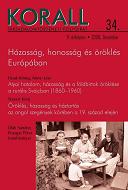Öröklés, házasság és háztartás az angol szegények körében a 19. század elején
Inheritance, Marriage and Household among the English Poor in the Early 19th Century
Author(s): Steven KingSubject(s): History
Published by: KORALL Társadalomtörténeti Egyesület
Summary/Abstract: While the history of courtship and marriage in England between the seventeenth and nineteenth centuries has become increasingly rich, the experiences and motivations of one particular group, the poor dependent upon communal charity, have been much neglected. Nowhere are the English records sufficiently detailed to pinpoint definitively the proportion of each marriage cohort that might be classed as dependent poor, or to detail their personal marriage motivations. Yet, in the English counties of Northamptonshire and Berkshire there is evidence that a significant minority of all marriages included at least one partner who might be classified as ‘dependent poor’ where one defines this as dependent upon either charity or communal poor relief under the English poor law (1601–1834). Piecing together sources as varied as letters and official correspondence, communal accounts, newspaper reporting, this article asks how such people, and their partners, conceived of marriage, made their marriage decisions and experienced early married life. Evidence that poor law officials intervened directly in the marriage market and marriage decision-making process is assembled and analysed. How important such intervention was at the level of the individual remains obscure, but it is clear that officials believed that paupers were better off married than single, that the fertility consequences of their interventions were muted and that rural overseers were in any case good at passing on the demographic consequences of their decisions to urban communities in particular. A supplementary and developmental analysis of pauper letters suggests that the households formed by the dependent poor may have been financially and residentially fragile, requiring support from parents, neighbours and ‘friends’ and above all from the poor law. Without extensive linkage between family reconstitutions and poor law data, it is impossible to document the extent of such dependence, but pauper letters suggest it to have been substantial. Importantly, the claims-making rhetoric of the newly married or those (such as parents) applying to the poor law indirectly so as to allow them to continue offerring support to poor newlyweds, appears to have touched a nerve in the rural communities analyzed here. While relief may have been intermittent, it was often substantial when worked out on a yearly basis, and officials clearly expected to be approached to help in supporting the households of the newlywed poor. Even where officials had real and enduring concerns over the moral standing and household management of paupers, they still paid rent, got clothes and furniture out of pawn, paid allowances and met doctoring bills. The particular, but not unrepresentative, experiences and strategies of two pauper families underpin the analysis and suggests that the underlying expectations that supporting new households was a valid part of the claims-making rhetoric, and the expectation of parish officials that t
Journal: Korall - Társadalomtörténeti folyóirat
- Issue Year: 2008
- Issue No: 34
- Page Range: 28-55
- Page Count: 28
- Language: Hungarian

